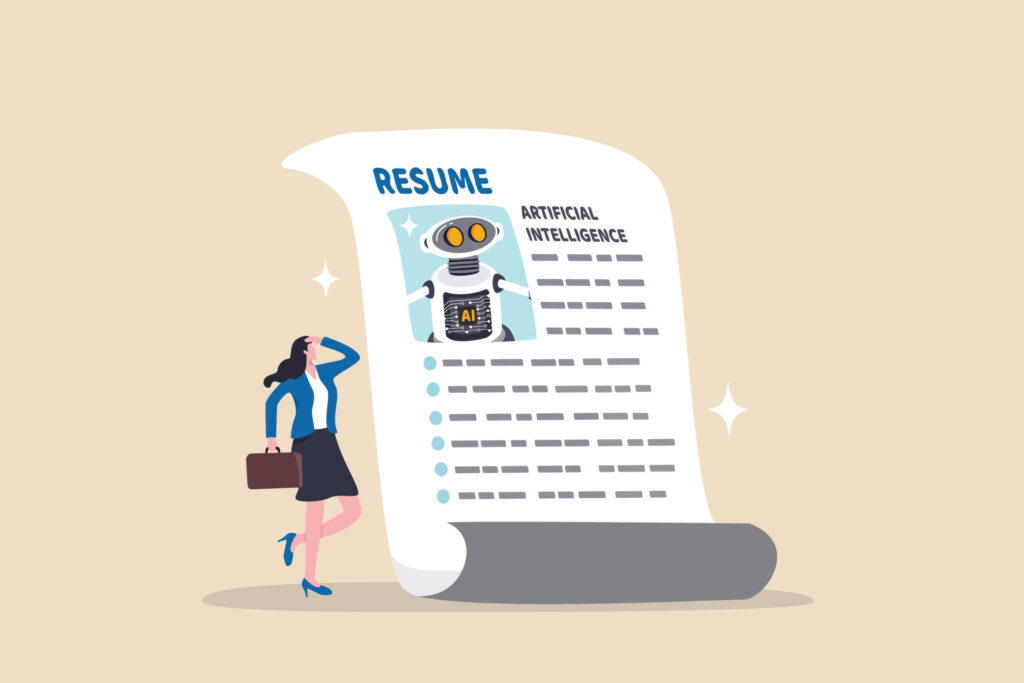Algorithms, automation, and machine learning are quickly becoming entrenched in today’s recruitment process. According to a recent survey, at least 99% of all Fortune 500 companies are now using AI tools to screen candidates during their hiring process.
Recruiters and hiring managers are using AI to help sort through vast quantities of applications and skim the cream off the top of the applicant pool, often using AI technology to “parse” resumes to streamline the hiring process. Resume parsers extract, analyze, and store resume data, which is then categorized, sorted, and searched via an automated process to assist a very human hiring manager or recruiter. Here are some tips that make a resume parser-friendly:
- Brevity wins the game — think bullets over paragraphs
- Keep the design simple — use a standard font, include your name in the file name, and nix the headers and footers
- No infographics, tables, or word art
- Keywords are key — research the role and cross-reference skills from past jobs that are in line with what is in the job description
By filtering out resumes that don’t have the necessary criteria, parsing software driven by AI can save countless hours that it would otherwise take to read through each application manually and has been largely adopted across industries. But just as hiring managers have leveraged AI to make their jobs easier, candidates have similarly gotten on the AI bandwagon, using the technology to quickly craft resumes and cover letters.
Like It or Not, Candidates Are Using AI, Too
Hiring managers, however, are not the only ones using AI to get a leg up in the hiring game — candidates have caught on to this time-saver and are increasingly using generative AI apps like ChatGPT to ramp up their resumes. Savvy job seekers know that customizing their resume to match a job posting gives them a leg up in the initial screening process — which can be tedious and time-consuming. AI resume-builders, however, promise fast and easy CV customization. It’s no surprise that the adoption of generative AI for resume-building is on the rise.
Results from a poll of more than 1,000 job seekers who had used ChatGPT in their job search by ResumeBuilder.com found that:
- Nearly half of those surveyed — 46% — said that they had used ChatGPT to write their resumes or cover letters.
- 70% shared that they had a better response rate when they used AI-generated materials.
- 40% believe that their interviewers were not aware that they had used ChatGPT to craft their job application materials.
- Just 11% said they were turned down for a job because they’d used ChatGPT.
The potential risks are outweighed by the time-saving benefits for most job seekers, with 88% of those surveyed saying that they’re “somewhat” (41%) or “highly” (47%) likely to keep using ChatGPT to write their resumes and cover letters in the future.
Screening Resumes Is Now More Involved than Ever
Just as AI has inculcated itself into hiring managers’ toolkits, it is increasingly becoming a candidate tool, too. While we like to think that most candidates are honest when listing their skills and professional experience — as AI technology proliferates and expands in use, so do those who use it disingenuously.
Candidates who rely solely on AI to craft their resumes may end up with ones full of inaccurate information. And in a bizarre twist of tech fate, they in theory could even find themselves using the same exact resume as another candidate who used the same AI tool to craft theirs.
As AI ramps up for hiring managers and job applicants, it has become even more critical to develop innovative screening strategies to ensure that the person on paper matches the abilities of the one in real life. Some simple ways to see if AI has overly doctored a resume include generic phrasing, repetitive language, and odd formatting. AI could be at play if the resume you receive has a markedly different writing style than the other application materials.
The good news is that some identification strategies can help you get the quality candidates you seek.
Here Are Some Smart Identification Strategies for Hiring Managers
While the game is changing, not all hope is lost. The hope is that after you interview a candidate, you’ve gained a sense of who they are. To ensure you get quality (and qualified) candidates, here are some smart strategies that can help.
- Ask questions that are experience-based as part of your hiring process. To see if a candidate has the knowledge to succeed at your company, ask questions about their process for solving business problems specific to your industry.
- Pay close attention to the skills section. While it’s a smart move to use the job description to guide what skills are highlighted, if a candidate’s skills are identical to the job description, however, with little deviation, it may be a sign that AI authored the resume and that the applicant did not refine it to reflect their true professional abilities.
- Rev up your use of references. Be curious and take the time to contact all a candidate’s references. Take stock not just of the answers, but the tone in response to questions you ask. And perhaps look to see if there are any testimonials on a candidate’s LinkedIn page when vetting potential hires.
- Carefully assess emails versus interview presentations. Listen for possible variances between what is written on a candidate’s application and what they share about their experience during the interview. Your goal is gauge how authentically the candidate has depicted their professional skills and background. If a resume shows stellar experience, but the person doesn’t seem to be familiar with the industry in the way you would imagine from the document — it can become quickly apparent that the author was ChatGPT or some other AI resume builder.
- Cross-reference the job application with how the candidate is positioned on LinkedIn and other professional platforms. Be on the lookout for divergent narratives. If the story on LinkedIn is inconsistent with the experience listed on a candidate’s resume or does not match up with how they talk about their experience in an interview, it may indicate that some of their story was falsified with the help of AI. Take the time to compare materials and interactions to get the complete picture.
- Go beyond resumes and cover letters to ensure that you hire qualified candidates. During the interview, make sure to ask questions about how the candidate might solve a real problem they may face in the role to gauge how ready they are to hit the ground running. For certain roles, sample projects and practical exercises can help you determine if a candidate can do the work that they say they can do.
- AI resume screening tools are just one tool in the box. Resume screening is just one step in the hiring process — the value of this type of tool is to make sure that spam candidates who are not qualified are eliminated as quickly as possible, so hiring managers can focus on those with the skills and experience to succeed in the role. Please keep in mind that AI screening is a tool, not a total solution — it can speed up screening and reduce manual effort, but it’s just one part of the process. It’s critical to do your due diligence and spend time interviewing and vetting possible hires on a more personal level.
__________________________________
Takeaway
Resume screening has always been a critical step in the hiring process, but the game has changed with the advent of AI. While existing tools can help separate the qualified from the unqualified candidates, it’s essential that you dive more deeply into a candidate’s skills and background to ensure that the potential hire you are considering has the experience and know-how listed on their resume.
Change is the only constant — hiring processes will keep evolving — and it’s essential that your company’s practices do, too. If you’re looking for guidance on how to best leverage the power of AI and talent, Creative Circle can help keep you ahead of the curve.




